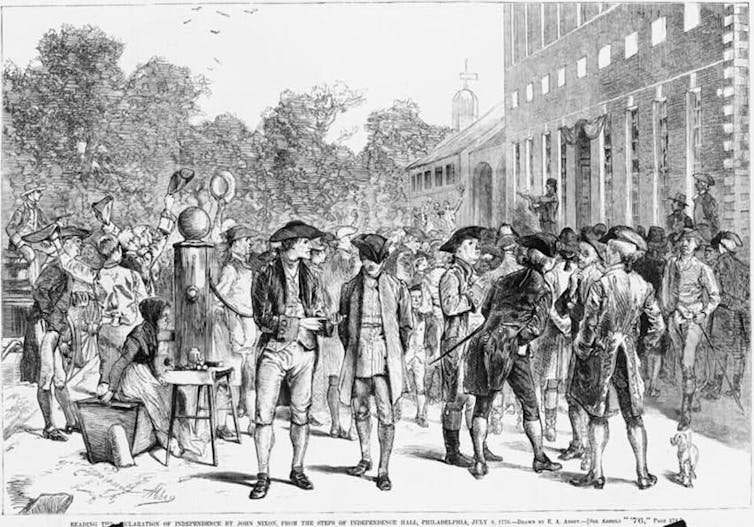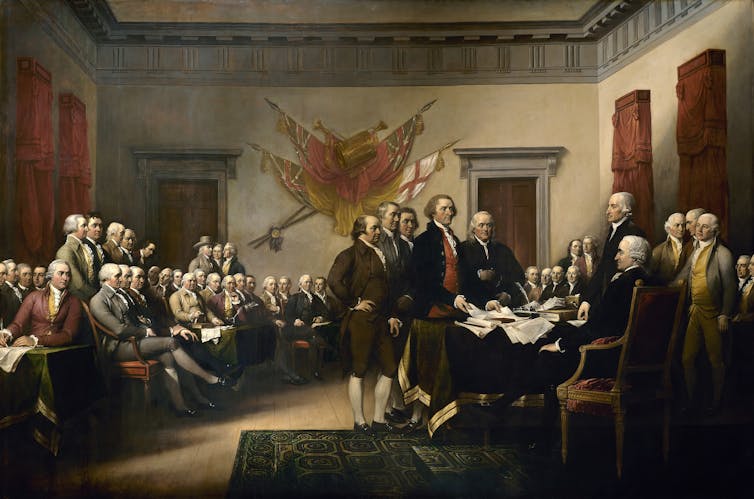
Experts in autocracies have pointed out that it is, unfortunately, easy to slip into normalizing the tyrant, hence it is important to hang on to outrage. These incidents which seem to call for the efforts of the Greek Furies (Erinyes) to come and deal with them will, I hope, help with that. As a reminder, though no one really knows how many there were supposed to be, the three names we have are Alecto, Megaera, and Tisiphone. These roughly translate as “unceasing,” “grudging,” and “vengeful destruction.”
Tomorrow is the Fourth of July, Independence Day, the commemoration of the adoption of the Declaration of Independence, our first national founding document (as you’ll see, there were local ones which preceded it and servied to authorize it.) There is much that we know about it (and I include in that the things we know that ain’t so) and much that we don’t. Some of the information which follows was news to me.
================================================================
The Declaration of Independence wasn’t really complaining about King George, and 5 other surprising facts for July Fourth

Pete Saloutos via Getty Images
Woody Holton, University of South Carolina
Editor’s note: Americans may think they know a lot about the Declaration of Independence, but many of those ideas are elitist and wrong, as historian Woody Holton explains.
His forthcoming book “Liberty is Sweet: The Hidden History of the American Revolution” shows how independence and the Revolutionary War were influenced by women, Indigenous and enslaved people, religious dissenters and other once-overlooked Americans.
In celebration of the United States’ 245th birthday, Holton offers six surprising facts about the nation’s founding document – including that it failed to achieve its most immediate goal and that its meaning has changed from the founding to today.
Ordinary Americans played a big role
The Declaration of Independence was written by wealthy white men, but the impetus for independence came from ordinary Americans. Historian Pauline Maier discovered that by July 2, 1776, when the Continental Congress voted to separate from Britain, 90 provincial and local bodies – conventions, town meetings and even grand juries – had already issued their own declarations or instructed Congress to.
In Maryland, county conventions demanded that the provincial convention tell Maryland’s congressmen to support independence. Pennsylvania assemblymen required their congressional delegates to oppose independence – until Philadelphians gathered outside the State House, later named Independence Hall, and threatened to overthrow the legislature, which then dropped this instruction.

Edward Austin Abbey, Harper’s Magazine, via Library of Congress
American independence is due in part to African Americans
Like the U.S. Constitution, the final version of the Declaration never uses the word “slave.” But African Americans loomed large in the first draft, written by Thomas Jefferson.
In that early draft, Jefferson’s single biggest grievance was that the mother country had first foisted enslaved Africans on white Americans and then attempted to incite them against their patriot owners. In an objection to which he gave 168 words – three times as many as any other complaint – Jefferson said George III had encouraged enslaved Americans “to purchase that liberty of which he has deprived them, by murdering the people upon whom he also obtruded them.”
Numerous other white Southerners joined Jefferson in venting their rage at the mother country for, as one put it, “pointing a dagger to their Throats, thru the hands of their Slaves.”
Britain really had forged an informal alliance with African Americans – but it was the slaves who initiated it. In November 1774, James Madison became the first white American to report that slaves were plotting to take advantage of divisions between the colonies and the mother country to rebel and obtain their own freedom. Initially the British turned down African Americans’ offer to fight for their king, but the slaves kept coming, and on November 15, 1775, Lord Dunmore, the last British governor of Virginia, finally published an emancipation proclamation. It freed all rebel- (patriot-) owned slaves who could reach his lines and would fight to suppress the patriot rebellion.
The Second Continental Congress was talking about Dunmore and other British officials when it claimed, in the final draft of the Declaration, that George III had “excited domestic insurrection amongst us.” That brief euphemism was all that remained of Jefferson’s 168-word diatribe against the British for sending Africans to America and then inciting them to kill their owners. But no one missed its meaning.

John Trumbull via Wikimedia Commons
The complaints weren’t actually about the king
Britain’s king is the subject of 33 verbs in a declaration that never once says “Parliament.” But nine of Congress’ most pressing grievances actually were about parliamentary statutes. And even British officials like those who cracked down on Colonial smuggling worked not for George III but for his Cabinet, which was in effect a creature of Parliament.
By targeting only the king – who played a purely symbolic role in the Declaration of Independence, akin to modern America’s Uncle Sam – Congress reinforced its novel argument that Americans did not need to cut ties to Parliament, since they had never had any.
The Declaration of Independence does not actually denounce monarchy
As Julian P. Boyd, the founding editor of “The Papers of Thomas Jefferson,” pointed out, the Declaration of Independence “bore no necessary antagonism to the idea of kingship in general.”
Indeed, several members of Congress, including John Dickinson of Pennsylvania, openly admired limited monarchy. Their beef was not with all kings and queens but with King George III – and him only as the front man for Parliament.
The Declaration of Independence fell short of its most pressing purpose
In June 1776, delegates who supported independence suggested that if Congress declared it soon, France might immediately accept its invitation to an alliance. Then the French Navy could start intercepting British supply ships bound for America that very summer.
But in reality it took French King Louis XVI a long 18 months to agree to a formal alliance, and the first French ships and soldiers did not enter the war until June 1778.
Abolitionists and feminists shifted the Declaration of Independence’s focus to human rights

New York Public Library
In keeping with the Declaration of Independence’s largely diplomatic purpose, hardly any of its white contemporaries quoted its now-famous phrases about equality and rights. Instead, as the literary scholar Eric Slauter discovered, they spotlighted its clauses justifying one nation or state in breaking up with another.
But before the year 1776 was out, as Slauter also notes, Lemuel Haynes, a free African American soldier serving in the Continental Army, had drafted an essay called “Liberty Further Extended.” He opened by quoting Jefferson’s truisms “that all men are created equal” and “endowed by their Creator with certain unalienable Rights.”
By highlighting these claims, Haynes began the process of shifting the focus and meaning of the Declaration of Independence from Congress’ ordinance of secession to a universal declaration of human rights. That effort was later carried forward by other abolitionists, Black and white, by women’s rights activists and by other seekers of social justice, including Abraham Lincoln.
In time, abolitionists and feminists transformed Congress’ failed bid for an immediate French alliance into arguably the most consequential freedom document ever composed.
[The Conversation’s Politics + Society editors pick need-to-know stories. Sign up for Politics Weekly.]![]()
Woody Holton, Professor of History, University of South Carolina
This article is republished from The Conversation under a Creative Commons license. Read the original article.
================================================================
Alecto, Megaera, and Tisiphone, I have been thinking this year that it isn’t really appropriate to make July 4th a celebration of freedom. It actually sympolizes poltical independence – a very different thing from personal freedom. To properly celebrate personal freedom, all of us need Juneteenth. Not that I’m trying to appropriate that holiday, which has the effect of taking it away from those who originated it. I don’t want to do that. But all of us might do well to quietly consider over it.
The Furies and I will be back.












